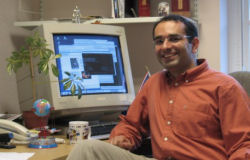Zoubin Ghahramani has been elected to the Professorship in Information Engineering in the area of Cognitive Systems Engineering, a key theme within the Department's strategy.

The Department is promoting a number of research themes that address major global challenges and are likely to attract high levels of external interest. Cognitive Systems Engineering addresses the problem of designing highly usable, fully integrated computer-based information systems that exhibit cognitive qualities. Zoubin will join the Department in January 2006 to help co-ordinate research and teaching in this field.
Zoubin attended the University of Pennsylvania where he obtained a BA degree in Cognitive Science and a BSEng degree in Computer Science. He obtained a PhD in Cognitive Neuroscience from the Massachusetts Institute of Technology, then moved to the University of Toronto where he was a Postdoctoral Fellow in the Artificial Intelligence Lab of the Department of Computer Science. For the last seven years, he has been at the Gatsby Computational Neuroscience Unit, University College London, where he is currently a Reader in Machine Learning. Zoubin also has an appointment as Associate Research Professor in the School of Computer Science at Carnegie Mellon University.
Zoubin's current research focuses on using Bayesian statistics as a framework for artificial intelligence and machine learning. Zoubin also works on applications of Bayesian machine learning to problems in bioinformatics, information retrieval, and pattern recognition. "I am excited by the possibilities that joining Cambridge University offers", he says. "Cambridge has great strength in areas related to machine learning, Bayesian statistics and cognitive systems, both within and outside the Engineering Department. I look forward to working with my colleagues in the Department and with the broader research community here to help establish Cambridge as a world leader in these areas."

